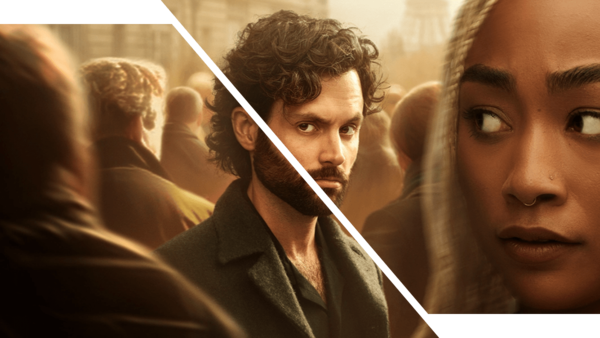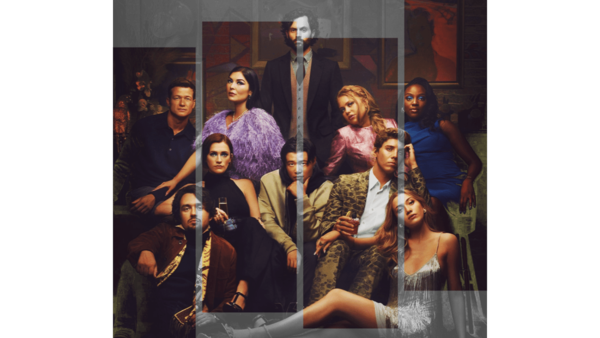In 'You' Season 4, The World’s Longest Sly Tweet Returns In Style
This is #CineFile, where our critic Rahul Desai goes beyond the obvious takes, to dissect movies and shows that are in the news. Today: You Season 4.

Last Updated: 03.04 PM, Feb 15, 2023
IN A WORLD WHERE writers and artists routinely get imprisoned for dissenting against totalitarian regimes, You doesn’t get the credit it deserves for single-handedly battling the onset of ‘cultural fascism’. I know. I know. This sounds like the sort of snarky observation that Joe, the protagonist of the criminally popular Netflix series, might offer without the slightest hint of irony. In that smug, sexy, scornful, beautifully condescending voiceover too. But hear me out. Regardless of how cool or tiresome You is, it takes immense courage and wit for it to exist — and thrive — in an age of hyperwokeism, cancel culture, keypad feminism, virtue signaling and a million other internet-era plagues. (I’m surprised I even know the terms.) Before you, Dear Reader, condemn me to the dark depths of digital oblivion — the depths that most offenders temporarily occupy after being called out by righteous Twitter mobs who promptly forget about their own outrage a year later — just know that it’s true. It’s true that you’re being entertained by your own good-looking troll, and you can’t get enough of it.
I’m not some old millennial or semi-boomer getting nostalgic about a psychopath whose entire personality is one endless sly tweet. You like Penn Badgley being ‘problematic’ and ‘offensive’ and ‘toxic’ and all those easy hashtags, taking potshots at everyone from armchair writers who romanticise the idea of writing to empty MeToo activism to California yoga moms, while still being hopelessly lovesick but chivalrous in a creepy-nice way. What else explains not one, not two, not three, but four seasons of You? You is the protest we are too embarrassed to detect. It’s the story of an old-school rebel stuck in a new-age revolution. Joe Goldberg just happens to be a murderer, sure, but he Facebook-stalks like we do, feels like we do, bitches and scrutinises like we wish we do, and most of all, loves like we dream of doing.
His violence is a parody of how storytelling views the ways of the heart and human instinct, not a glorification of it. He is the best and worst versions of us at once, and it’s no small deal that over three-and-a-half seasons, the man has managed to turn repetition — the cornerstone of human nature — into an artform. I, for one, still wish I could articulate my disdain for people the way he does. I still chuckle at his impossibly sharp commentary about contemporary life, only to wonder what my chuckling says about me. Joe is not aspirational as a character, but his intellect is.
That said, Part 1 of Season 4 — the first five episodes premiered on February 9 (the final five will drop on March 9) — is probably the cheekiest installment of You yet. After fleeing Madre Linda and the plastic purgatories of Suburban America, Joe is now Professor Jonathan Moore in London. Of course he’s a professor; academics is a breeding ground for predators who abuse the sanctity of the teacher-student equation. Yet, the beauty is that Joe is not one of them; it’s too much of a cliche. He considers himself above cliches. Love is history for him, both literally and otherwise. He came to London for Marienne — the one who got away in Season 3 — but stays for, well, himself. His ‘European vacation’ is derailed by his reluctant initiation into a gang of deliriously wealthy and tone-deaf British pseudo-celebrities. And a mysterious serial killer who starts knocking them off, one by one, while stalking poor Jonathan with Joe-like texts. There’s also a potential love interest in the form of Kate, the only sane one of the gang and an icy gallery manager whose sexual tension with Jonathan is a subset of her animosity towards him. We all know how that goes.
Just when we thought You had run out of tricks to rile Cinephile Twitter up, its latest premise proves that the game is still afoot. It also suggests that Joe is not immune to — and afraid of — trends. You is not averse to the social temperatures of film-making. If anything, it was only a matter of time before You set its sights on — and mercilessly trolled — what’s hot and in the news. The latest season sees Joe — who views himself as a hapless victim after killing his first girlfriend, his second girlfriend and his (equally unhinged) wife named Love, amongst others — going rogue as well as vogue. Because Joe’s latest adventure is shaped by the two most topical genres of storytelling today: The rich-people-suck narrative and the whodunit. This is Joe’s White Lotus, Triangle of Sadness and Glass Onion moment. Complete with his own critical appraisal of this moment. The “Eat-The-Rich killer” is on the loose, and an entire episode unfurls at a plush countryside manor that would make Agatha Christie blush. As Joe puts it: “What is this? The Crown directed by Guy Ritchie?”.

MUCH OF OUR ENJOYMENT of You is derived from the fact that Joe is essentially the kind of loner who thinks he’s better because he’s a lover of literature. He has what I like to call the Reader Syndrome — a superiority complex rooted in the escapism of words, thoughts and theories that are almost never his. He believes that learning is a worthy substitute for living, and is therefore driven by the curated bitterness of realising that reality will never be as clever and idealistic as fiction. That those turns of phrase will always be more attractive than twists of fate. For instance, when the rich folks start getting murdered, Joe’s anxieties have nothing to do with the lingering threat to his own life; his problem is that “I’m trapped in a whodunit, the lowest form of literature”. To watch him lose control of his fate in this season is like watching a literary snob blindsided by the crowd-pleasing tropes of social satires and cheap crime fiction. It’s almost like Joe is being undone by his own elitism — he is too smart to navigate the daftness of privilege and best-selling plots. He even takes pointers from one of his own Gen Z students, who in turn judges him for being closed to the more mainstream genres of writing.
Given that viewers like myself spend most of their time appreciating the irony of Joe’s panic-stricken curses by thinking “rich coming from Joe,” the richness and sudden commercialism of his setting is somewhat fitting. He acts like a vintage reader at sea with the quirks of modern fiction. So the hunter-becoming-the-hunted template is organic — Joe is genuinely bereft of his Sherlock-level thought-fart skills — but also a wry reminder that even deluded sociopaths are vulnerable if they don’t adapt to the changing tides. In other words, You places Joe in a cesspool of mediocrity — his greatest kryptonite — so that he struggles to lower his standards to survive. He has to now strive for pedestrian themes like redemption and selflessness. And his love finally exposes itself for what it really is: Obsession. The story might be familiar, but the context is wickedly entertaining.
It’s this conflict that You inflates well to reveal the identity of the killer. (Spoilers ahead, so imagine reading this in Joe’s self-satirical voice: It’s on…You…now). The twist might sound all sorts of silly — even most uncharacteristic of a meta show like this — but it does make sense. The climax of the fifth episode discloses the eat-the-rich killer as the only other sensible ‘commoner’ in the gang: An author. He’s the only character Joe initially relates to and likes. The man, Rhys, wrote a memoir that launched him out of poverty, a book that Joe himself admires very much. And now he’s running for London mayor, the only post that might give him the power to erase all the entitled one-percenters from the population of Britain. He will be a leader who exploits not the poor but the rich. As a spoof on class rage — where Joe is expected to engage in a war of wits and large-scale trolling with his ‘equal’ — this revelation of You is effective enough. You can see why it’s heading in that direction. It had to be Joe’s alter-ego, which is the version of the cop-criminal duality that innovative shows like Killing Eve have built entire cults on. Rhys’ political career is a legitimate front, something that Joe lacks. He is getting a taste of his own medicine as an illegal immigrant in a foreign land.
But look at it through the lens of You-ness, and it’s even better. Joe, the compulsive and egotistic reader, is up against his new rival: The Actual Writer. The one who’s actually achieved something beyond stalker tales and tragic backstories. Joe thinks he knows literature, except that’s also his blind spot. He was always too busy being cynical and canny to put his verbal talent to paper. For readers like him, their favourite writers are invincible, above all scrutiny and blame; they’re also objects of envy and desire. Rhys mentions that Joe’s past inspired him — an equivalent of a storyteller ‘preying’ on an unwitting fan. He even tries to recruit him, only to be disappointed by Joe’s warped sense of morality and conscience; what makes Joe Joe is his ability to conflate his incel-like outbursts with his innate sense of goodness. It’s only fair that the jolted consumer of art will square up against the bitter creator in 2023. It’s the purest relationship there is. It’s also the most unforgiving love story there is.
